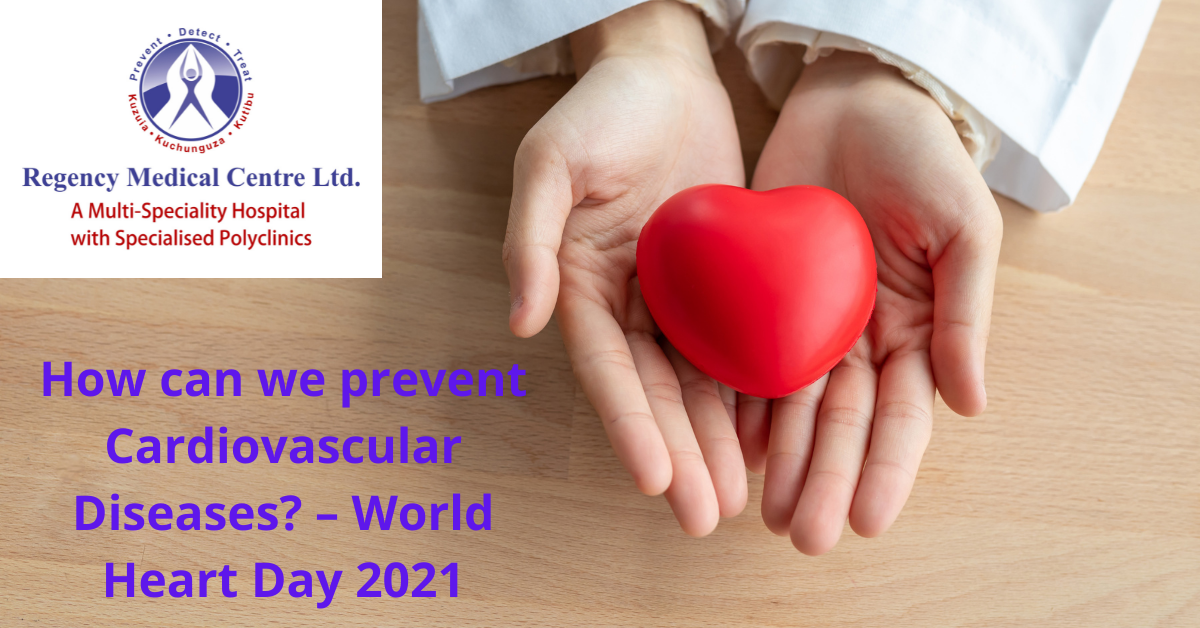How can we prevent Cardiovascular Diseases? – World Heart Day 2021
105 viewsHeart diseases are of many types and can be distinguished by what it does to your heart. A common type of heart disease is coronary artery disease (CAD), making it harder for your heart to get the blood it needs. CAD can lead to heart attacks that cause chest pain and shortness of breath. Sometimes, cardiac diseases can come unexpectedly without giving any warning. Doctors can diagnose and prevent cardiac diseases only when a person experiences some symptoms of a heart attack, failure, stroke, or arrhythmia.
Tanzania’s health sector has many challenges to face. The life expectancy at birth is just 59 years, and the human resources gap is 40%. The nation is experiencing an epidemiologic transition to non-communicable diseases. There has been a significant increase in diabetes, cancer, heart disease, and the total number of deaths caused by these illnesses is estimated to be 46,000 per year. Regency Medical Center has experienced and professional cardiologists in Dar es Salaam to prevent heart diseases and help you lead a healthier life.
 The Three Types of Preventive Stages for Cardiac Diseases
The Three Types of Preventive Stages for Cardiac Diseases
Scheduling a check-up for cardiac care in Dar es Salaam can be as easy as making wise choices now that will pay off the rest of your life. The three types of prevention often mentioned are secondary, primary, and primordial. All three have different elements and will have different effects. Cardiovascular disease prevention can start young or old, but all must be aware of “smart choices” to make now that will pay off the rest of their lives.
Secondary Prevention
Secondary prevention includes quitting smoking, exercising more, and following a healthy diet. Your medical provider may also prescribe medications like aspirin and statins to take when needed. If you’ve already had a heart attack or stroke, you may need to undergo angioplasty or bypass surgery as a part of cardiac care. Secondary prevention can prevent a second stroke, stop the disease midway, and even early death.
Primary Prevention
To prevent cardiac diseases, it’s essential to get your risk factors down. Primary prevention focuses on controlling these risk factors before they get bad enough to trigger a heart attack or stroke. For instance, high blood pressure and high cholesterol are both cardiovascular risk factors. Primary prevention works towards making changes in lifestyle and medications. However, the emergence of some risks like inflammation, atherosclerosis, etc., are already growing and can’t be reversed.
Primordial Prevention
Preventative measures, such as the prevention of inflammation and atherosclerosis, are what we call “primordial prevention.” Primordial prevention can help keep these at bay by working to stop them before they happen. If you can start this early on, you’ll be ahead of the game and more likely to avoid things like high blood pressure and high cholesterol.
 Which Risk Factors You Can Prevent and Control?
Which Risk Factors You Can Prevent and Control?
The American Heart Association’s latest statistics show a rise in deaths from cardiovascular disease. Although the number is still lower than a few years ago, this trend needs to be addressed. Despite the decline, an estimated 80% of cases can be prevented by controlling high blood pressure and cholesterol and maintaining healthy habits.
RMC celebrates this year’s World Heart Day by increasing the awareness for cardiac care in Dar es Salaam. The theme for 2021 is “harnessing the power of digital health to improve awareness, prevention, and management of cardiovascular diseases.” Keeping your heart healthy can be done by eating healthier, being more active, and smoking less. Simple maneuvers like these would have a massive impact on your health and could potentially reduce the risk of heart disease. Are you ready to take the pledge? Read through these prevention strategies below:
Switch to a Healthy Diet
You might not think about your food habits when it comes to heart disease and stroke risks, but what you eat can make a big difference. To reduce your risk of diseases, you should choose foods with little or no saturated fat, trans, or sodium. In other words, forget the processed meat sandwiches and try eating some meatless meals! Be mindful that a healthy diet for cardiac care also includes plenty of fruit, vegetables, whole grains, fish, legumes, nuts, and seeds. If you still want to include meat, choose lean meat.
Start Exercising
You should exercise at least 150 minutes every week. That’s only about 20 minutes at a time, five times per week. Moderate-intensity aerobic activities like brisk walking are best. Still, if you want to get even better results and prevent cardiac diseases, you can do 75 minutes of vigorous-intensity like jogging, running, or both. And don’t forget to do muscle-strengthening activities twice a week that work all your major muscle groups.
Be Aware of Your Family History
Stay healthy by looking back through your family history. The closer you are to someone with heart disease, the higher your risk. If they are your parents or siblings, you have an even greater chance of developing heart disease. You can help prevent this by maintaining a healthy weight, exercising regularly, not smoking, and eating healthier. Keep your doctor informed about your family’s medical history.
Manage Your Stress
The long-term effects of stress can do more than increase your blood pressure. It can also raise your heart rate, which may damage the walls of your arteries. Learning stress management techniques not only benefits you physically, but also your quality of life. For example, deep breathing exercises and finding time each day to do something you enjoy are great ways to take care of yourself. Volunteering is another great way to relieve stress.
Begin a Regular Wellness Program
Cardiologists in Dar es Salaam are the perfect person to help you understand your heart health. Be proactive with your physician, so you can start screenings. You’ll need to talk about diet, lifestyle, blood pressure, cholesterol, heart rate, and blood sugar. And if you’re pregnant, overweight, or have diabetes, you may also need to be tested for sugar levels. At RMC, we have specialized cardiologists in Dar es Salaam that would help you know where you stand and make it possible to prevent more risks.
Avoid Tobacco and Alcohol
 You want to stay away from tobacco, but alcohol is a different story. Alcohol may increase blood pressure and cause weight gain, which can cause other health issues. To stay healthy, don’t smoke and drink responsibly. If you’re trying to quit smoking, talk with your health care provider for help finding the best way for you to stop drinking alcohol.
You want to stay away from tobacco, but alcohol is a different story. Alcohol may increase blood pressure and cause weight gain, which can cause other health issues. To stay healthy, don’t smoke and drink responsibly. If you’re trying to quit smoking, talk with your health care provider for help finding the best way for you to stop drinking alcohol.
Get Enough Sleep
Sleep is as essential as the air we breathe and the food we eat. Sleep apnea can lead to breathing difficulties during sleep. This interrupts your ability to rest, leading to other health problems such as high blood pressure, obesity, and diabetes. 7-9 hours night sleep is a must for an average adult. You can improve your sleep by following good sleep habits and speaking to a doctor about possible treatment options if you have sleep apnea.
Greater Risk of Heart Disease in Some Specific Cases
Older people are at risk of heart disease, but the risk varies by sex. Over 45 years, men and 55 years women are more prone to cardiac disease than people aged 18-44. However, some sex-specific risk factors increase heart disease risk, like diabetes. Estrogen may help prevent cardiac disease, but diabetes is a bigger risk for women.
Certain groups have higher risks for heart disease, such as African Americans. In contrast, Hispanic Americans have a lower risk. Asian groups vary in risk for heart disease, but some groups have higher chances, such as South Asians. Lastly, the risk increases if a close family member had heart disease at a young age.
Conclusion
Living a healthy lifestyle is the best way to avoid and delay many conditions in your heart and brain, such as diabetes and cancer. This means being active and fit, eating healthy, avoiding tobacco, and managing other risk factors that may put you at a greater chance of cardiovascular or neurological diseases. At RMC, we offer innovative and dependable expert services by the best pool of cardiologists in Dar es Salaam. Working relentlessly towards bringing awareness for cardiac diseases and preventing risks is our aim.
Talk to our doctors today, and book an appointment if you are facing any heart-related issues.

